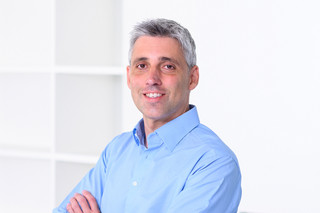Zum 1.7.2021 startet Dr. David Vilchez seine neu geschaffene Professur am Kölner Exzellenzcluster für Alternsforschung CECAD (Cellular Stress Responses in Aging-Associated Diseases ), einer interfakultären biomedizinischen Forschungseinrichtung der Medizinischen und Mathematisch-Naturwissenschaftlicher Fakultät. Die Professur baut auf seine Tätigkeit am CECAD auf, wo Vilchez seit 2014 eine Arbeitsgruppe zum Thema „Proteostase der Alterung und Stammzellen“ leitet.
Vilchez erforscht mit seinem Team die Rolle der Proteostase für das Überleben und die Funktion von Stammzellen. Mit `Proteostase´ werden zelluläre Prozesse beschrieben, die Proteinsynthese, Faltung und Abbau innerhalb der Zelle regulieren und damit das zelluläre Proteom - Gesamtheit aller Proteine in einem Lebewesen - schützen. Störungen dieses Gleichgewichts können die Lebensdauer verkürzen und Zellen vorzeitig altern lassen. Auch altersbedingte Erkrankungen wie Herzkrankheiten, Diabetes und Neurodegeneration sind mögliche Folgen. Vilchez Forschung zielt auf einem genauen Verständnis darüber, wie Stammzellen ihr Proteom erhalten. Die Haupthypothese seines Labors ist, dass die Protein-Qualitätskontrolle eine Schlüsseldeterminante der Stammzellfunktion darstellt, die den Alterungsprozess vorantreiben kann. Da Experimente mit embryonalen Stammzellen von Säugetieren eindeutig ihre Fähigkeit zur kontinuierlichen Replikation und das Fehlen von Seneszenz (Wachstumsstopp nach limitierter Zellteilung) gezeigt haben, geht Vilchez und sein Team der Annahme nach, dass diese Zellen ein neuartiges Paradigma zur Untersuchung der Regulation der Proteostase und ihres Untergangs im Alterungsprozess darstellen könnten. „Wir haben entdeckt, dass humane embryonale Stammzellen eine unglaublich hohe Proteasom-Aktivität haben, verglichen mit vielen Nicht-Stammzelllinie“, so der Forscher. Proteasomen sind zelluläre Proteinkomplexe, die als multikatalytische Enzyme Proteine abbauen, darunter auch krankheitsbedingte Proteine, die zur Aggregation neigen. „Eine der nächsten großen Herausforderungen wird es sein, herauszufinden, wie das Netzwerk der Proteostase die Funktion der Stammzellen beeinflusst. Wir wollen verstehen, wie dieses Netzwerk angepasst werden kann, um altersbedingte Erkrankungen wie Alzheimer, Parkinson und Chorea Huntington zu lindern“, erklärt Vilchez. „Ich freue mich sehr, über die Berufung meine Forschungs- und Lehrtätigkeit hier in Köln fortsetzen zu können.“
Der 1978 in Spanien geborene David Vilchez Guerrero erwarb 2001 den Bachelor of Science an der Universität von Barcelona/Spanien und promovierte dort am Institute for Research in Biomedicine (IRB). Als Postdoktorand war er am Salk Institute (La Jolla, USA) und am Li Ka Shing Center, University of California (Berkeley, USA) tätig. Während seiner Postdoc-Ausbildung untersuchte Vilchez die Rolle der Proteostasis in menschlichen embryonalen Stammzellen und langlebigen Mutanten des Fadenwurms Caenorhabditis elegans. 2016 wurde er mit dem IRB Alumni of Excellence Award ausgezeichnet, 2015 erhielt er einen ERC-Starting Grant der Europäischen Kommission.
*english version*
David Vilchez appointed to W2 professorship for "Integrated Stress Response Signaling”
On July 1, 2021, Dr. David Vilchez will start his newly created professorship at the Cologne Cluster of Excellence for Aging Research CECAD (Cellular Stress Responses in Aging-Associated Diseases), an interfaculty biomedical research institution of the Faculty of Medicine and the Faculty of Mathematics and Natural Sciences. The professorship builds on his work at CECAD, where Vilchez has led a research group on "Proteostasis of Aging and Stem Cells" since 2014.
Vilchez and his team are investigating the role of proteostasis in the survival and function of stem cells. Proteostasis describes cellular processes that regulate protein synthesis, folding and degradation within the cell and thus protect the cellular proteome - the totality of all proteins in a living organism. Disturbances in this balance can shorten lifespan and cause cells to age prematurely. Age-related diseases such as heart disease, diabetes and neurodegeneration are also possible consequences. Vilchez's research aims to gain a precise understanding of how stem cells maintain their proteome. His lab's main hypothesis is that protein quality control is a key determinant of stem cell function that can drive the aging process. Because experiments with mammalian embryonic stem cells have clearly demonstrated their ability to replicate continuously and the absence of senescence (growth arrest after limited cell division), Vilchez and his team are pursuing the hypothesis that these cells may represent a novel paradigm for studying the regulation of proteostasis and its demise in the aging process. "We discovered that human embryonic stem cells have incredibly high proteasome activity compared to many non-stem cell lineages," he said. Proteasomes are cellular protein complexes that act as multicatalytic enzymes to degrade proteins, including disease-related proteins that are prone to aggregation. "One of the next big challenges will be to figure out how the proteostasis network affects stem cell function. We want to understand how this network can be adapted to alleviate age-related diseases such as Alzheimer's, Parkinson's and Huntington's disease," Vilchez explains. "I am very pleased to be able to continue my research and teaching activities here in Cologne through this appointment."
Born in Spain in 1978, David Vilchez Guerrero received his Bachelor of Science degree from the University of Barcelona/Spain in 2001 and his PhD from the Institute for Research in Biomedicine (IRB) there. As a postdoctoral fellow, he worked at the Salk Institute (La Jolla, USA) and the Li Ka Shing Center, University of California (Berkeley, USA). During his postdoctoral training, Vilchez investigated the role of proteostasis in human embryonic stem cells and long-lived mutants of the nematode Caenorhabditis elegans. In 2016, he was awarded the IRB Alumni of Excellence Award, and in 2015 he received an ERC Starting Grant from the European Commission.
